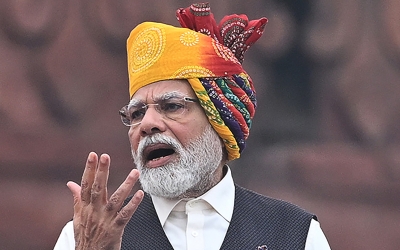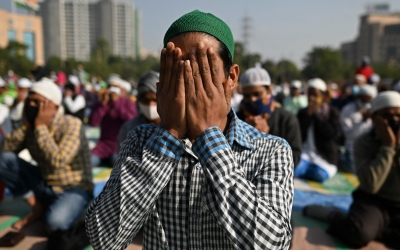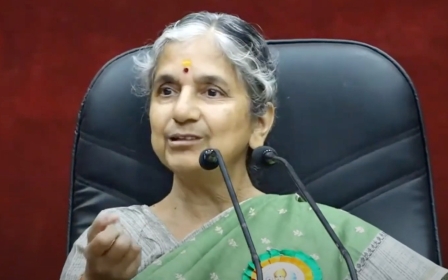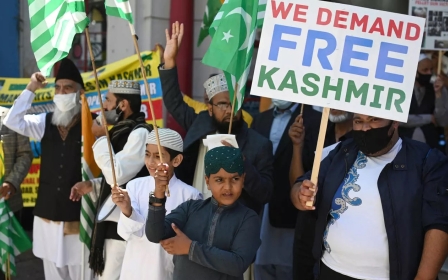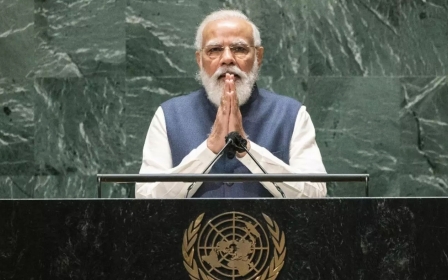Bharat: How Modi's move to rename India could break the link with 1947
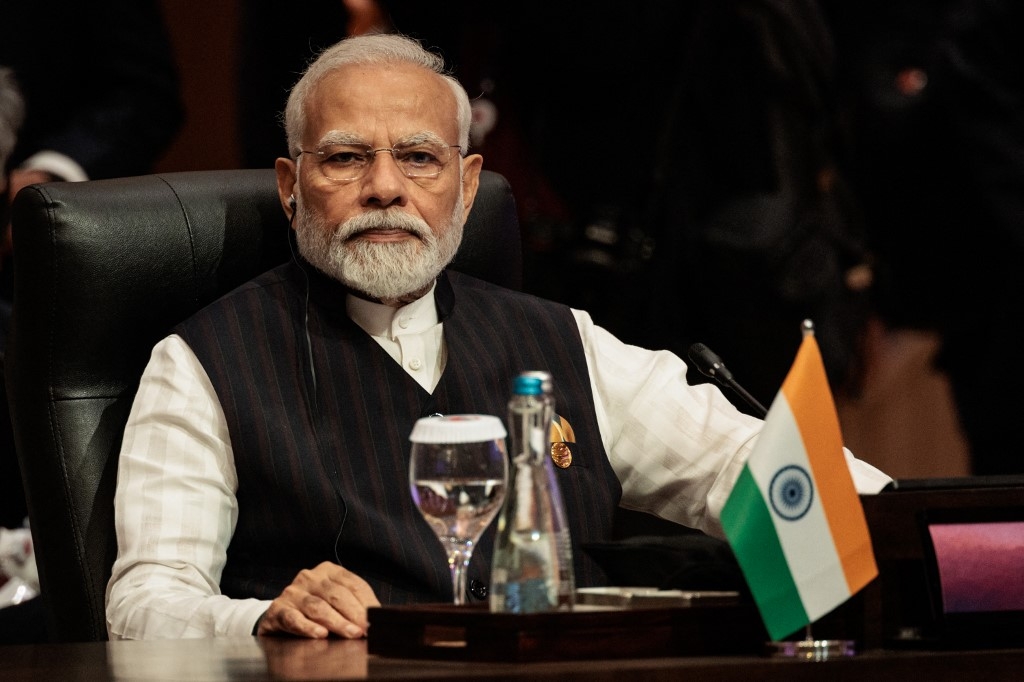
This weekend, India hosts the G20 summit for leaders from around the world - and on Tuesday the government duly issued the official invitation to a state dinner.
Yet the invitation contained no reference to India. Instead, it described the host country as Bharat, a Sanskrit term rooted in ancient Hindu scriptures.
This wasn’t a transcription error.
Over 75 years after independence, Narendra Modi’s India is preparing to change the nation’s name. The move may come within weeks.
Many believe that a special session of parliament later in September will involve politicians from the ruling party - significantly called the Bharatiya Janata Party (BJP) - proposing a resolution to officially call the country Bharat.
New MEE newsletter: Jerusalem Dispatch
Sign up to get the latest insights and analysis on Israel-Palestine, alongside Turkey Unpacked and other MEE newsletters
“The entire country is demanding that we should use the word Bharat instead of India,” declared Harnath Singh Yadav, a member of Parliament for Modi’s BJP. “The word India is an abuse given to us by the British whereas the word Bharat is a symbol of our culture.”
Sushil Modi, one of the BJP’s most prominent politicians, echoed his sentiment. “The name India was given by the Britishers,” he argued, defending the use of the name Bharat on the G20 dinner invitation.
Decolonisation
There is a deep history behind this astonishing development. Prime Minister Modi’s government, which has governed India since 2014, has long since embarked on a process that it sees as decolonisation.
This means erasing British influence and Islamic rule, both of which the Hindu nationalists in power see as oppressive.
It also means fighting the old secular Indian nationalist elite which founded the country and governed it almost uninterruptedly through the Congress Party until 2014.
Exemplified by Jawaharlal Nehru, India’s famously charming first prime minister, Hindu nationalists have always viewed this elite as westernised and hopelessly out of touch with the people they governed.
Undoing the identity constructed for the Republic of India when the British left in 1947 is central to the Hindu nationalist vision for the country.
The name change on the G20 invitation comes as India prepares for what some see as the most important general election in the nation’s history - a contest which will determine whether India maintains the pluralistic traditions of the past or continues down Modi’s chosen path of Hindutva ethno-nationalism.
At one level the name change is a simple rejoinder to the recently formed alliance of 28 opposition parties, who are gearing up for the general election by naming themselves “INDIA”.
But using the Sanskrit term Bharat is about much more than simple electoral competition. For Hindu nationalists, it’s about the soul of the country.
Akhand Bharat
J Sai Deepak, the foremost Hindu nationalist intellectual in India today, argues that Indian Hindus have had their minds twisted by Islamic and British rule to the extent that they have lost any understanding of Bharat, which he sees as an ancient Hindu concept. Unsurprisingly, he couldn’t be more enthusiastic about the name change.
Deepak is drawing on the ideas of Vinayak Savarkar, the man who, almost a century ago, articulated the first coherent vision of Hindu nationalism as we know it today, Hindutva.
It was centred on the idea of conflict with Muslims, who Savarkar argued were essentially foreign. He wrote of an ancient emperor called Bharat whose empire “embraced the whole continent from the Indus to the sea and aimed to weld it into a nation”.
In recent years, this has led to the idea of Akhand (Undivided) Bharat to be an expansionist fantasy, popular among Hindu nationalist politicians and ideologues. For them it represents a unified polity encompassing India, Pakistan, Bangladesh, Afghanistan, Nepal and Myanmar - with Modi’s BJP in Delhi undoubtedly in charge.
In June, India’s minister of parliamentary affairs provoked a diplomatic row by tweeting a map of these places in ancient times displayed in India’s new parliament with the caption: “The resolve is clear. Akhand Bharat.”
Pakistan’s foreign office instantly condemned what it called a “revisionist and expansionist mindset”, and even the generally pro-Indian Bangladeshi government expressed its concern.
Akhand Bharat has never been more than a fantasy.
India as a construct
For now, Hindu nationalists aim to establish a Hindu Rashtra (Hindu Nation) within the borders of India that were drawn in 1947. This is an idea which threatens minorities within India but not, at this stage, adjacent nations.
Now, in response to the rumours that India could adopt the name Bharat, local media reports in Pakistan are suggesting that their country could stake a claim to the name India.
So far, this is all just rumour, but it recalls the controversy that surrounded the name India when British rule ended and India and Pakistan were formed as separate nation-states.
Muhammad Ali Jinnah, the lawyer-politician who led the All-India Muslim League and founded Pakistan, was outraged that his nation’s larger neighbour would be called India.
He believed that Pakistan was a part of India, the great landmass recognised as a coherent civilisation for centuries. Jinnah saw India as a construct that was altogether greater than the two new nation-states.
He suggested calling what is today India, Bharat, or Hindustan, signifying its membership of a larger and even more capacious entity called India.
Instead, the Republic of India presented itself through its name as the natural successor to British India, with Pakistan as an aberration.
Jinnah never accepted this. After partition, he refused to renounce his claim to Indianness and even assumed for a while that he would be able to keep his mansion in Bombay and move easily between the two countries. This was before the conflict over Kashmir, when many politicians in Pakistan and India alike thought that partition was only temporary and hoped for an eventual reunion.
The historian Ayesha Jalal suggests that “Jinnah never quite abandoned his strategy of bringing about an eventual union of India on the basis of Pakistan and Hindustan”. This theory is unlikely to ever be proven or disproven but it is certainly true that, until his death, Jinnah insisted on reserving the name India for the entire subcontinent.
Freed from the chains of 1947
Ironically, if India’s Hindu nationalists achieve their aim and rename their country Bharat, it would open up the possibility of the subcontinent’s other countries emphasising their historical Indian identity.
With Indianness no longer being a political signifier, it could take on a cultural and civilisational meaning. Almost certainly, it would eventually lead to the world describing the subcontinent as a whole as India.
With Indianness no longer being a political signifier, it could take on a cultural and civilisational meaning
The semantic and psychological transformation would be immense. You could speak of music produced in Pakistan as Indian music, and of Urdu as an Indian language - as both Jinnah and Nehru knew it was. You could talk of Indians in Delhi, Dhaka and Lahore.
This is why the people most ardently opposed to the idea of renaming India are those wedded to the original Nehruvian conception of the Indian nation.
Prominent Congress politician and writer Shashi Tharoor is one example. On Tuesday, he argued that the name India “has incalculable brand value” and urged the government not to “relinquish our claim to a name redolent of history”.
Tharoor believes that by adopting the name Bharat, his country would renounce the exclusive claim to Indian identity that it adopted with partition. He is correct.
By imposing its narrow vision of national identity on the country, Hindu nationalism could finally unshackle the idea of India from the chains of 1947.
The views expressed in this article belong to the author and do not necessarily reflect the editorial policy of Middle East Eye.
Middle East Eye delivers independent and unrivalled coverage and analysis of the Middle East, North Africa and beyond. To learn more about republishing this content and the associated fees, please fill out this form. More about MEE can be found here.



